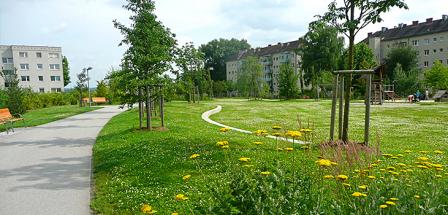STAR Performance and Effectiveness of Green Infrastructure Stormwater Management Approaches in the Urban Context: A Philadelphia Case Study Progress Review Meeting & Webinar
Date and Time
Tuesday 05/09/2017 1:00PM to 8:30PM EDTLocation
Details
 The U.S. Environmental Protection Agency (EPA), as part of its Science to Achieve Results (STAR) program, funded five grants to support investigating the performance and effectiveness of green infrastructure (GI) practices at the urban watershed level to address the complexities of urban communities and contribute to a more holistic understanding of the potential of GI in the urban water cycle. For these grants, the city of Philadelphia, specifically its 40,500-acre Combined Sewer Overflow (CSO) area, is the geographic study area. At this meeting, the five recipients of these grants are presenting their research. Their presentations will address how, collectively, the portfolio of research has addressed each of the five research areas identified in the 2012 RFA, Performance and Effectiveness of Green Infrastructure Stormwater Management Approaches in the Urban Context: A Philadelphia Case Study.
The U.S. Environmental Protection Agency (EPA), as part of its Science to Achieve Results (STAR) program, funded five grants to support investigating the performance and effectiveness of green infrastructure (GI) practices at the urban watershed level to address the complexities of urban communities and contribute to a more holistic understanding of the potential of GI in the urban water cycle. For these grants, the city of Philadelphia, specifically its 40,500-acre Combined Sewer Overflow (CSO) area, is the geographic study area. At this meeting, the five recipients of these grants are presenting their research. Their presentations will address how, collectively, the portfolio of research has addressed each of the five research areas identified in the 2012 RFA, Performance and Effectiveness of Green Infrastructure Stormwater Management Approaches in the Urban Context: A Philadelphia Case Study.
U.S. EPA Safe and Sustainable Water Resources Research
These STAR grants and funded research are supported by EPA’s Safe and Sustainable Water Research Program (SSWR). SSWR research program efforts are done in partnership with other EPA programs, federal and state agencies, academia, nongovernmental agencies, public and private stakeholders, and the global scientific community. Through an integrated science and engineering approach, the SSWR research program is developing cost-effective, sustainable solutions to these 21st century complex water issues and proactively addressing emerging concerns.
It is EPA's policy to make reasonable accommodation to persons with disabilities wishing to participate in the agency's programs and activities, pursuant to the Rehabilitation Act of 1973, 29 U.S.C. 791. Any request for accommodation should be made to Angela Page at page.angela@epa.gov or 202-564-7957.
Attendees have the option of receiving a certificate of attendance for this webinar. Acceptance of the certificate for licensures, certifications, or continuing education is contingent on state and/or organization requirements—EPA cannot guarantee acceptance.
Presentations:
STAR Progress Review for Philadelphia Green Infrastructure Grants (PDF) Dr. Jim Johnson(14 pp, 3 MB, 05/17/2017)
What Critical Steps Need to Occur and Pivotal Links Need to be Established For The Successful Adoption and Implementation of GI Practices (PDF) Dr. Tom Ballestero(60 pp, 4 MB, 05/18/2017)
Using demonstrations, how can GI practices in highly urbanized communities be systematically evaluated in terms of the early benefits, long-term performance effectiveness, and economic viability (PDF) Dr. Laura Toran (42 pp, 5 MB, 05/18/2017)
How Can Cities Establish Sub-watershed Scale Approaches to Monitor and Evaluate Both the Individual Performance and Combined Effectiveness of GI Practices (PDF) Dr. Robert Traver (50 pp, 22 MB, 05/18/2017)
EPA STAR Progress Review Meeting: Incentivizing Green Infrastructure in Philadelphia (PDF) Dr. David Hsu(52 pp, 6 MB, 05/08/2017)
What are the benefits of urban GI to neighborhoods and communities and how can they best be evaluated, both quantitatively and qualitatively, addressing ancillary value, ecosystem services, monetization, neighborhood livability, etc (PDF) Dr. Arthur McGarity (69 pp, 5 MB, 05/18/2007)
